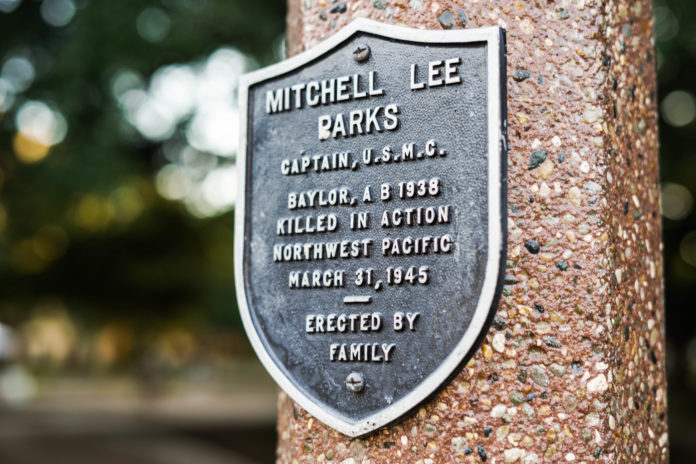
By Sarah Pinkerton | Staff Writer
Baylor is home to around 800 veteran students across all degree levels. In a recent article from the U.S. News & World Report, it ranked 47th nationally for veterans, second in the Big 12 and second in Texas.
To reach this ranking, Baylor offers veteran students nine different services for their transition back to student life through the Veteran Educational and Transition Services office, or VETS.
VETS Program Manager Kevin Davis said that Baylor VETS aims to serve not only veteran students, but also military dependents and spouses. He said as veterans make the transition back to student life from military life, they often lose structure.
“They come from a highly structured military world where everything is kind of pre-planned out,” Davis said. “They’ve got orders for every little detail that they experience, so going from that environment to … a college environment where the decisions they’re having to make on a daily basis are infinitely more and they seem more insignificant.”
Services include the VETS Academic Support Center, Career Center, learning accommodations, graduate school preparation, the VA VITAL program and the VA work-study program.
Davis said they work to create structure and a study calendar, sit down with the veterans and their spouse or kids to make weekly schedules, connect veterans on campus, demilitarize resumes, identify OALA services for military-connected conditions, create classroom accommodations and work with their VA benefits to make the best decisions.
“Baylor is a Yellow Ribbon School, which means that Post-9/11 GI Bill covers $24,000 annually in tuition and fees, and then Yellow Ribbon is an agreement that Baylor has made that says, ‘Hey, we’ll kick in half of the remaining costs’ and the VA kicks in the other half,” Davis said. “So, for a fully eligible Post-9/11 GI Bill student, our VA beneficiaries have zero out-of-pocket costs for tuition and fees.”
He said that 60% of Baylor’s student veterans are first-generation college students.
Additionally, opportunities such as the VETS orientation, VETS Transition course, VETS Online Community and VETS Lounge further the connection between veterans.
The VETS Online Community through Microsoft Teams is set up and paid for for every veteran who becomes involved and the VETS Lounge allows veterans to connect with each other face-to-face.
“We created this online community where they can identify people that have similar backgrounds. They can find different channels where they can connect,” Davis said. “Someone’s looking for childcare options — they can find students that have kiddos. We have different announcements for VA benefits.”
He said finding community is more challenging for non-traditional students.
“You’re older. You’ve got other demands. You’ve got a full time job sometimes. You’re married. You’ve got kids,” Davis said. “You’ve got other demands pulling you different ways, and so anyway we can bring community to them.”
The VETS Transition Course aims to assist veterans in their transition from military life to academic life while also building community within veterans on campus.
“They get to connect on a weekly basis with not only me as support resources, but they also connect with each other, and that’s probably the biggest benefit of that is they get one time of the week where they can connect with other vets like them and just kind of exhale a little bit,” Davis said.
This semester also began the VETS Chapel alternative.
“For one of the chapel requirements, they can take that with me, and we facilitate great conversation around faith formation,” Davis said “And what does that mean in the context of coming back from these experiences.”
Jessica Alford, VA coordinator, said that in her seven years at Baylor, the university’s military affiliated students have increased by 120%.
“A lot of our veteran students are transfer students,” Alford said. “So they have been in school somewhere else, and they come here to finish up their degree which we’re very, very thankful for.”
She said Baylor’s veteran students appear to be higher achieving than traditional undergraduate students.
“I think it comes from their worldly experience,” Alford said. “They’re older, more mature, time management, those kinds of things … especially what they bring to the classroom. When they’re in the classroom with younger students, they just have a whole different perspective on what’s being discussed.”
Debbi Parker, VA coordinator, said that the veterans on campus that she has talked to are excited to be working towards their degree with the educational benefits that come after service.
“Whatever their future plans are, whether it’s still serving, because we do have some active duty students, so whether it’s to continue serving in the military or do something else entirely, they’re grateful to be here, and we’re certainly grateful for them,” Parker said.
Davis said that there has been support across campus for the VETS’ mission.
“I’ve got students now that have gone through the McNair Scholars Program, and are now working on their PhDs, and they come from combat veteran background of getting shot at and dealing with the trauma of all of that,” Davis said. “And overcoming that self-doubt, ‘Do I fit in this academia world?’”





